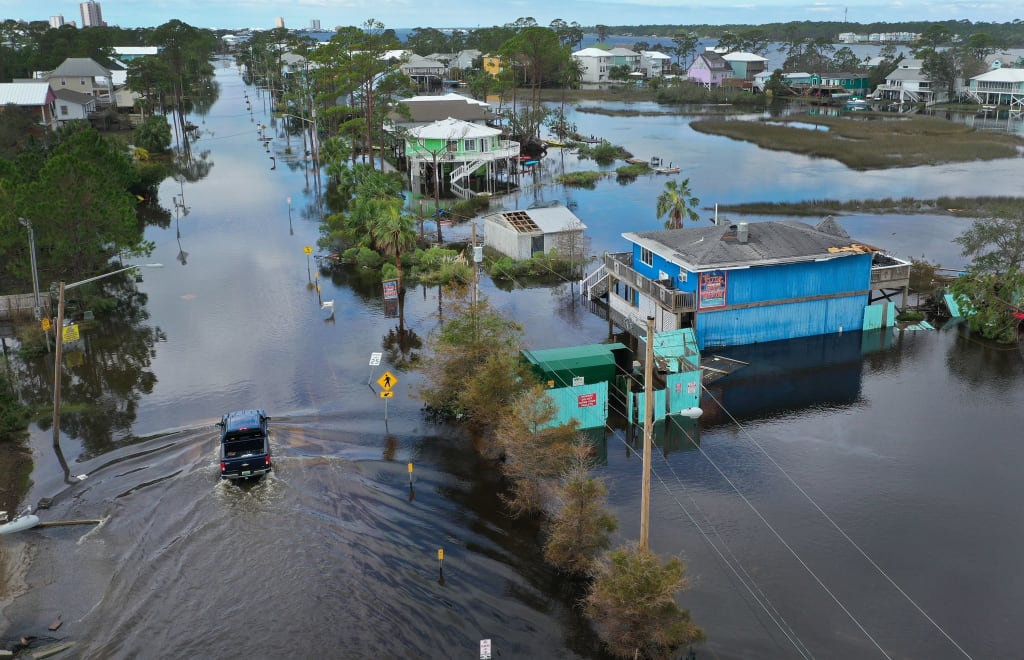The Rising Tides: The Effects of Climate Change on Coastal Communities in the US
How Sea-Level Rise, Storm Surge, and Coastal Erosion are Threatening America's Coasts

Introduction:
The world is currently experiencing the effects of climate change, and the consequences are felt by communities around the globe. One of the most vulnerable groups to climate change is coastal communities, as they are directly affected by the rising sea levels, increased storm surges, and coastal erosion. In the United States, the coastlines are home to over 39% of the population, and as such, it is imperative to understand the effects of climate change on these communities. This article will explore the impact of climate change on coastal communities in the US and its long-term implications.
Sea-Level Rise:
Sea-level rise is one of the most direct impacts of climate change on coastal communities. The National Oceanic and Atmospheric Administration (NOAA) predicts that sea levels will rise between 1 and 8 feet by the end of the century, depending on the rate of greenhouse gas emissions. This rise in sea level threatens to inundate low-lying areas and displace millions of people who live in coastal communities. In addition to the displacement of people, sea-level rise also has economic implications, as it threatens vital infrastructure, such as roads, bridges, and ports.
Storm Surge:
Storm surge is another major impact of climate change on coastal communities. Storm surges occur when strong winds and low pressure cause water to pile up in a given area, leading to coastal flooding. With climate change, sea levels are rising, making storm surges more intense and dangerous. Hurricane Katrina, which devastated New Orleans in 2005, was a prime example of the devastating impact of storm surges. The storm surge from Hurricane Katrina led to the failure of levees, causing widespread flooding and significant damage to the community. Storm surges can also result in significant property damage, as well as loss of life.
Coastal Erosion:
Coastal erosion is another consequence of climate change on coastal communities. Coastal erosion is the gradual wearing away of the shoreline due to the action of waves, tides, and storms. With climate change, sea levels are rising, and storms are becoming more frequent and severe, exacerbating coastal erosion. Coastal erosion can lead to the loss of property and infrastructure, as well as the destruction of habitats and ecosystems.
Long-term Implications:
The effects of climate change on coastal communities are not just immediate, but they also have long-term implications. Rising sea levels and increased storm surges can lead to the permanent loss of land and the displacement of communities. In addition, the loss of land and infrastructure can have significant economic implications, as it can impact industries such as tourism, fishing, and shipping. The loss of habitats and ecosystems can also lead to a decline in biodiversity and the extinction of species, which can have significant ecological and economic impacts.
Adaptation and Mitigation:
Adaptation and mitigation are two strategies that can be employed to address the effects of climate change on coastal communities. Adaptation involves making changes to infrastructure, policies, and practices to reduce the impact of climate change. This can include building sea walls, elevating buildings, and improving drainage systems. Mitigation involves reducing greenhouse gas emissions to slow the rate of climate change. This can include transitioning to renewable energy sources, reducing energy consumption, and implementing carbon pricing policies.
Conclusion:
In conclusion, the impact of climate change on coastal communities in the US is a pressing issue that requires immediate action. The rising tides, intensified storm surges, and coastal erosion are threatening the safety, livelihoods, and well-being of millions of people who call the coastlines their home. It is crucial that policymakers, communities, and individuals take steps to address the causes and effects of climate change. This can involve adaptation and mitigation strategies, as well as increasing awareness and advocating for change. Ultimately, addressing climate change is a collective effort that requires a global response. By working together, we can mitigate the impact of climate change on coastal communities and build a more sustainable future for generations to come.





Comments
There are no comments for this story
Be the first to respond and start the conversation.